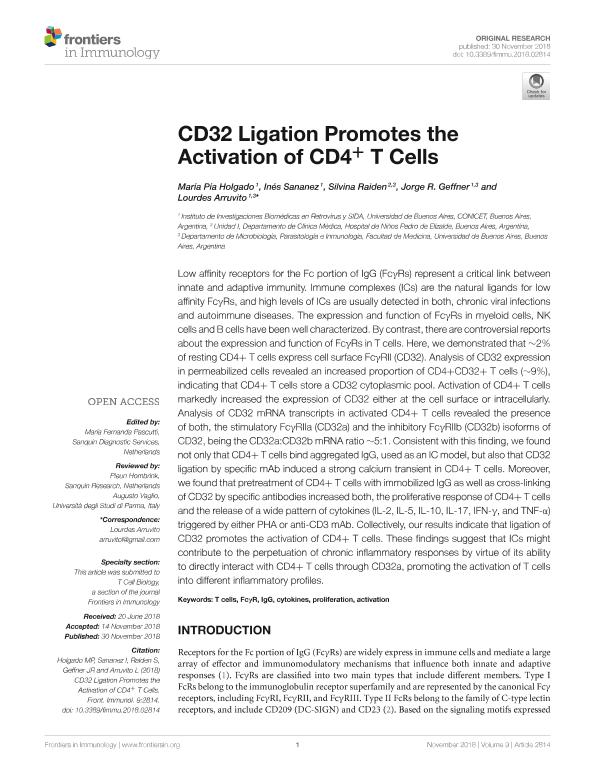Artículo
CD32 ligation promotes the activation of CD4+T cells
Holgado, María Pía ; Sananez, Inés
; Sananez, Inés ; Raiden, Silvina Claudia
; Raiden, Silvina Claudia ; Geffner, Jorge Raúl
; Geffner, Jorge Raúl ; Arruvito, Maria Lourdes
; Arruvito, Maria Lourdes
 ; Sananez, Inés
; Sananez, Inés ; Raiden, Silvina Claudia
; Raiden, Silvina Claudia ; Geffner, Jorge Raúl
; Geffner, Jorge Raúl ; Arruvito, Maria Lourdes
; Arruvito, Maria Lourdes
Fecha de publicación:
11/2018
Editorial:
Frontiers Media SA
Revista:
Frontiers in Immunology
ISSN:
1664-3224
Idioma:
Inglés
Tipo de recurso:
Artículo publicado
Clasificación temática:
Resumen
Low affinity receptors for the Fc portion of IgG (FcγRs) represent a critical link between innate and adaptive immunity. Immune complexes (ICs) are the natural ligands for low affinity FcγRs, and high levels of ICs are usually detected in both, chronic viral infections and autoimmune diseases. The expression and function of FcγRs in myeloid cells, NK cells and B cells have been well characterized. By contrast, there are controversial reports about the expression and function of FcγRs in T cells. Here, we demonstrated that ∼2% of resting CD4+ T cells express cell surface FcγRII (CD32). Analysis of CD32 expression in permeabilized cells revealed an increased proportion of CD4+CD32+ T cells (∼9%), indicating that CD4+ T cells store a CD32 cytoplasmic pool. Activation of CD4+ T cells markedly increased the expression of CD32 either at the cell surface or intracellularly. Analysis of CD32 mRNA transcripts in activated CD4+ T cells revealed the presence of both, the stimulatory FcγRIIa (CD32a) and the inhibitory FcγRIIb (CD32b) isoforms of CD32, being the CD32a:CD32b mRNA ratio ∼5:1. Consistent with this finding, we found not only that CD4+ T cells bind aggregated IgG, used as an IC model, but also that CD32 ligation by specific mAb induced a strong calcium transient in CD4+ T cells. Moreover, we found that pretreatment of CD4+ T cells with immobilized IgG as well as cross-linking of CD32 by specific antibodies increased both, the proliferative response of CD4+ T cells and the release of a wide pattern of cytokines (IL-2, IL-5, IL-10, IL-17, IFN-γ, and TNF-α) triggered by either PHA or anti-CD3 mAb. Collectively, our results indicate that ligation of CD32 promotes the activation of CD4+ T cells. These findings suggest that ICs might contribute to the perpetuation of chronic inflammatory responses by virtue of its ability to directly interact with CD4+ T cells through CD32a, promoting the activation of T cells into different inflammatory profiles.
Palabras clave:
ACTIVATION
,
CYTOKINES
,
FCΓR
,
IGG
,
PROLIFERATION
,
T CELLS
Archivos asociados
Licencia
Identificadores
Colecciones
Articulos(INBIRS)
Articulos de INSTITUTO DE INVESTIGACIONES BIOMEDICAS EN RETROVIRUS Y SIDA
Articulos de INSTITUTO DE INVESTIGACIONES BIOMEDICAS EN RETROVIRUS Y SIDA
Articulos(OCA HOUSSAY)
Articulos de OFICINA DE COORDINACION ADMINISTRATIVA HOUSSAY
Articulos de OFICINA DE COORDINACION ADMINISTRATIVA HOUSSAY
Citación
Holgado, María Pía; Sananez, Inés; Raiden, Silvina Claudia; Geffner, Jorge Raúl; Arruvito, Maria Lourdes; CD32 ligation promotes the activation of CD4+T cells; Frontiers Media SA; Frontiers in Immunology; 9; 2814; 11-2018; 1-12
Compartir
Altmétricas



